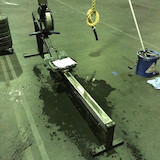Display the current date and time from multiple timezones as a bunch of wall clocks.
Our goal?
We want to display the current time for a number of locations around the world in the form of a wall of clocks:
2:48:34 AM
America/New_York
7:48:34 AM
Europe/London
4:48:34 PM
Asia/Tokyo
5:48:34 PM
Australia/Brisbane
3:48:34 PM
Australia/Perth
Method
We will need two components: an individual clock component (say
./WallClock.svelte) and a container that manages the clocks by feeding
them the current local time and required locale (say
./WallClocks.svelte). WallClock.svelte will calculate the time in
it’s locale and draw a clock with this time.
WallClocks.svelte
Similarly to our table of locations and times, we will set an interval that updates a variable, which is used as a prop to the clock component:
<script>
import { onMount, onDestroy } from 'svelte';
import WallClock from './WallClock.svelte';
export let timezones = [
'America/New_York',
'Europe/London',
'Asia/Tokyo',
'Australia/Brisbane',
];
let intervalId;
let now = new Date();
onMount(() => {
intervalId = setInterval(() => {
now = new Date();
}, 1000);
});
onDestroy(() => {
if (intervalId) {
clearInterval(intervalId);
}
});
</script>
<div class="clocks">
{#each timezones as timezone}
<div class="clock">
<WallClock {now} {timezone} />
</div>
{/each}
</div>WallClock.svelte
The individual clock component uses toLocaleString() as our table
version, and parses the output:
<script>
export let timezone;
export let now;
let hours = 0;
let minutes = 0;
let seconds = 0;
let amPm = '';
$: {
const d = now.toLocaleString('en-US', {
timeZone: timezone,
hour: 'numeric',
minute: 'numeric',
second: 'numeric',
});
[ hours, minutes, seconds, amPm ] = d.split(/[ :]/);
}
</script>
<div>
<svg>
...
</svg>
</div>
The clock face itself is built with SVG. Rather than reproduce the it here, you are encouraged to check the clock example from the Svelte Example list; the example at the top of this page uses this code verbatim.
Usage
Use the component wherever it’s required:
<script>
import WallClocks from './WallClocks.svelte';
</script>
<WallClocks />Summary
We have created two components that can be used to display wall clocks based on timezone.
